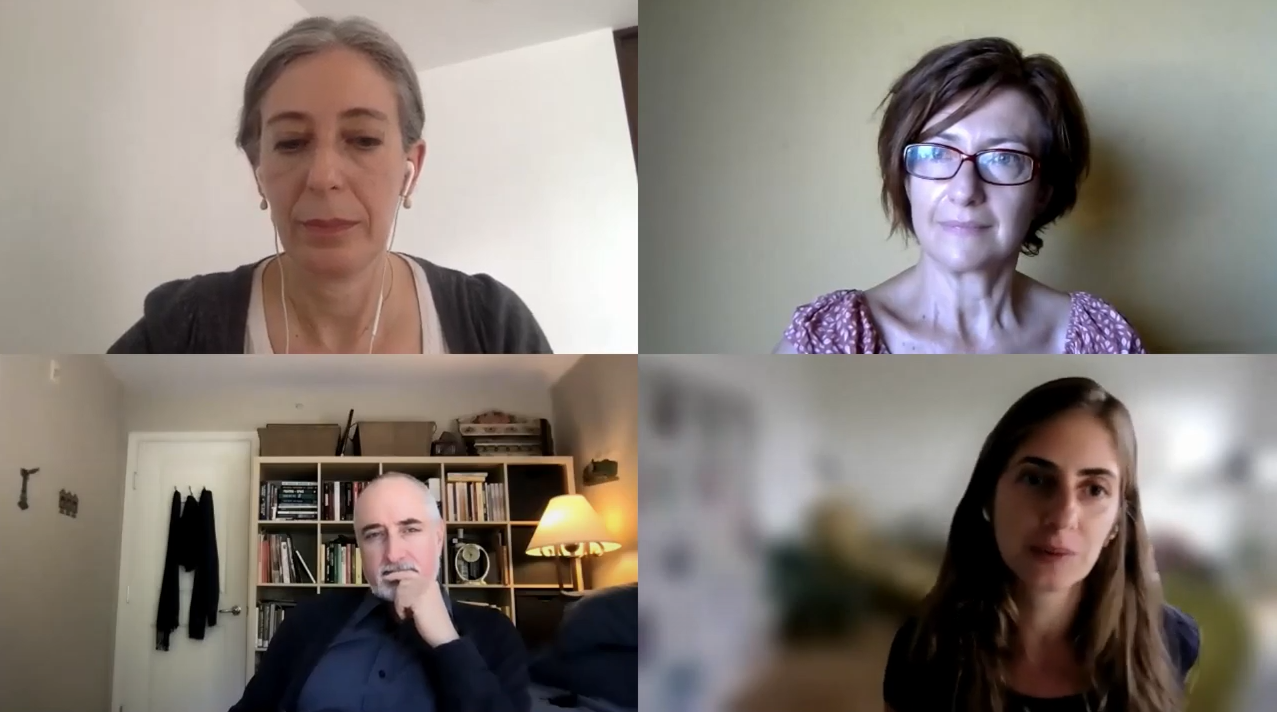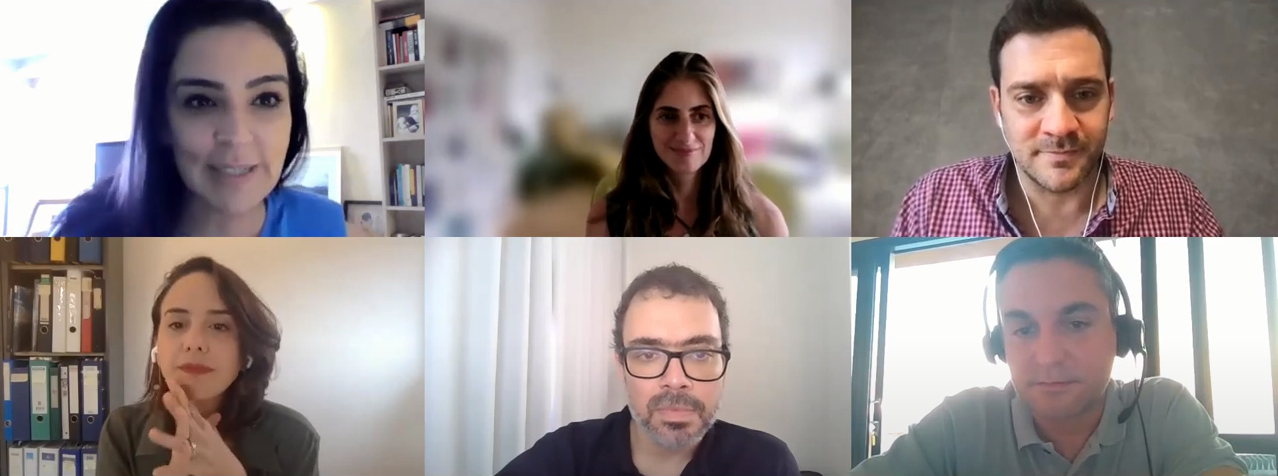News
News August 2021
CURRENTLY @ LATINNO
LATINNO Final Conference and Report
After six years of intense work, the LATINNO project has officially ended this summer. To celebrate, we held a conference on June 24th and 25th to which we invited experts from across the globe to discuss some findings of the project and the usability of our data for future research. The event, which had almost 400 registrations, started with a keynote speech by Mark Warren, and was followed by three roundtables, held in all three languages of the project (English, Spanish and Portuguese).
Although this will be LATINNO's last newsletter, our datasets will remain available in our website and in a public data repository. You can access them by clicking on the links provided below. Also, check out the highlights of the event and watch the recordings in our YouTube channel!
LATINNO Final Report and Codebook
The final report, available in English, Spanish and Portuguese, completes LATINNO’s five years of work and comprises three parts. The first part introduces the project, its analytical framework, methodology, and the dataset. The second part highlights some results, trends, and recommendations that draw on the LATINNO data. Finally, the third part presents a brief narrative of how democratic innovations have evolved in each of the 18 countries investigated, underlining some of the relevant cases contained in the dataset.
Pogrebinschi, T. (2021). Thirty Years of Democratic Innovation in Latin America. WZB Berlin Social Science Center: Berlin http://hdl.handle.net/10419/235143
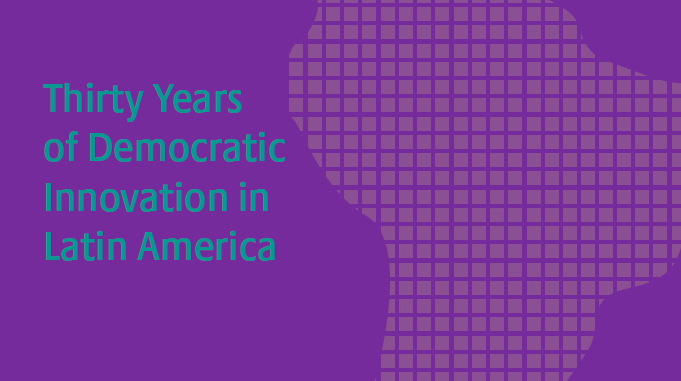
The LATINNO Codebook indicates and describes all the variables and values that allow to capture each individual case that constitutes the dataset. Each case is coded for three sets of variables related to context, institutional design, and impact.
Pogrebinschi, T. (2021). Codebook for the LATINNO Dataset. Technical Report. Wissenschaftszentrum Berlin für Sozialforschung.
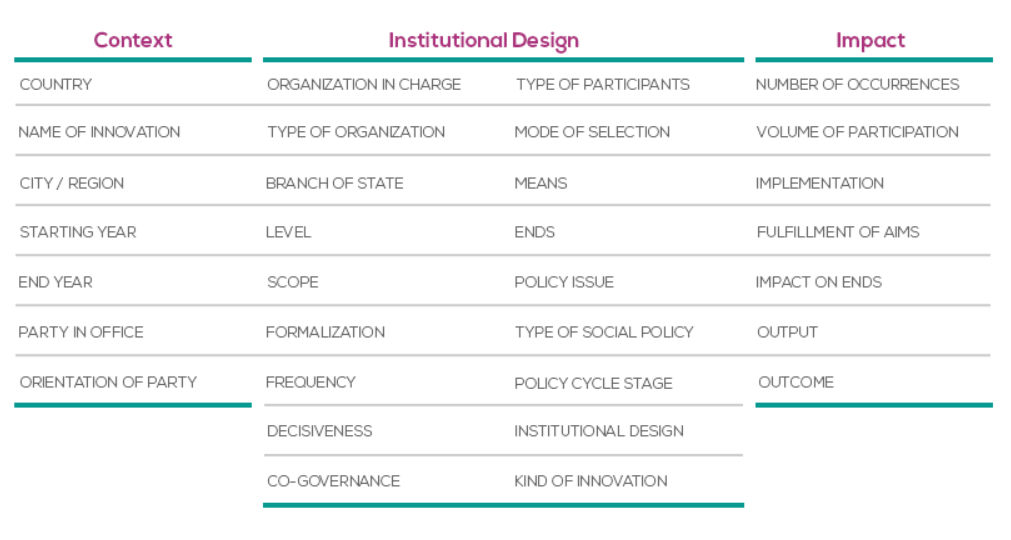
Datasets Released
LATINNO Dataset on Democratic Innovations in Latin America
The LATINNO dataset comprises 3,744 institutions, processes, and mechanisms involving citizen participation which were created in 18 Latin American countries between 1990 and 2020. It is the first and so far the most comprehensive and systematic source of knowledge on democratic innovations evolved in Latin America. The dataset can be accessed in our website and in addition to that, it will be available for download at the GESIS SowiDataNet|datorium after an embargo.
Pogrebinschi, T. (2021) LATINNO Dataset on Democratic Innovations in Latin America. Version 1.0.0. WZB Berlin Social Science Center. Dataset. DOI: https://doi.org/10.7802/2278
Collective Intelligence Initiatives against COVID-19 in Latin America Dataset
This dataset comprises a selection of democratic innovations from the "LATINNO Dataset on Democratic Innovations in Latin America" which rely on collective intelligence to respond to problems resulting from the COVID-19 pandemic in 18 countries of Latin America. The dataset will be available for download at the GESIS SowiDataNet|datorium after an embargo.
Pogrebinschi, T. (2021) Collective Intelligence Initiatives against COVID-19 in Latin America Dataset. Version 1.0.0. WZB Berlin Social Science Center. Dataset. DOI: https://doi.org/10.7802/2279
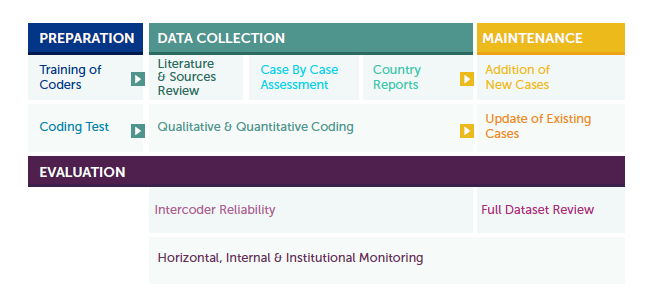
Civil Society Responses to COVID-19 in Latin America Dataset
This dataset comprises initiatives from civil society organizations to respond to the COVID-19 pandemic in 18 countries in Latin America and can be accessed in our website. Additionally, the dataset will be available for download at the GESIS SowiDataNet|datorium after an embargo.
Pogrebinschi, T. (2021) Civil Society Responses to COVID-19 in Latin America Dataset. Version 1.0.0. WZB Berlin Social Science Center. Dataset. DOI: https://doi.org/10.7802/2280
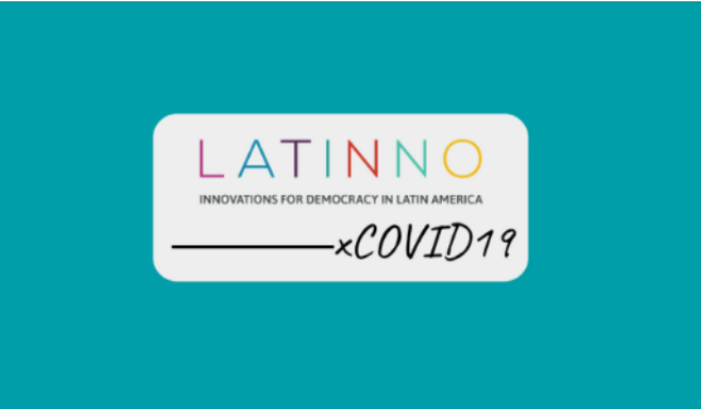
Event Highlights
|
Mark Warren's Keynote Speech, “Democratic Innovations and Representative Democracies” explained some of the factors leading to the need for democratic innovations. In his words: "The crisis of democracy is a crisis of electoral democracy. Democratic innovations need to target to democratic deficits, by including those who tend to be excluded from electoral politics".
In the first roundtable, titled "30 Years of Democratic Innovation in Latin America", our Founder and Coordinator, Thamy Pogrebinschi, presented the project's analytical framework and main findings. After this presentation, Max Cameron (University of British Columbia), Yanina Welp (Albert Hirschman Centre), Brian Wampler (Boise State University) and Gisela Zaremberg (FLACSO Mexico), offered their inputs, moderated by Melisa Ross (WZB Berlin).
The second roundtable, titled "The role of Civil Society and Digital Technologies in Democratic Innovation" sought to reaffirm LATINNO's commitment to make data and information available not only to the academia, but also to civil society and policymakers. The Roundtable started with a presentation byThamy Pogrebinschi, which highlighted the the trends in terms of digital engagement and collective intelligence in Latin America, and continued with analyses carried out by Pedro Abramovay (Open Society Foundations), Beatriz Pereira (Instituto Update), Matias Bianchi (Asuntos del Sur) and Tiago Peixoto (World Bank), moderated by Bruna Santos (Escola Nacional de Administração pública).
On June 25th, the third roundtable, titled "Measuring and Comparing Democratic Innovations: LATINNO Dataset" took place. We invited researchers who have been working with our data to tell us how LATINNO makes it possible to measure and compare democratic innovations. After an input by Melisa Ross, who presented the project's methodology,its goals and the variables, as well as how to acces the project's main database, César Nicandro Cruz (GIGAPP), Christiana Freitas (Universidade Nacional de Brasilia), Ernesto Cruz Ruiz (Technische Universität München), Rafael Sampaio (Universidade Federal do Paraná) offered insights concerning existing and further research relying on data from LATINNO. The last Roundtable was moderated by our coordinator Thamy Pogrebinschi.
|


